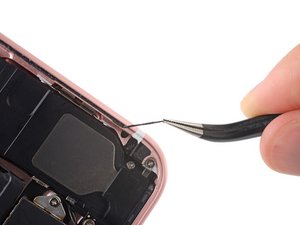
Display Adhesive
|
18 Answers 26 Score |
iPhone stuck on red battery logo screen |
|
4 Answers 28 Score |
Changing the motherboard can remove iCloud |
|
6 Answers 2 Score |
Panic CPU x caller - Reboot every 3 minutes - Charging Port Flex? |
|
25 Answers 191 Score |
I can't hear my phone calls unless I put it on speaker. |
These are some common tools used to work on this device. You might not need every tool for every procedure.
Released on June 29, 2007, the very first iPhone blew up the idea of the cell phone, putting a personal computer/phone/assistant at your fingertips at all times, and pioneering the push to the modern era of the smartphone with one its features being the game changing touchscreen interface. When Steve Jobs introduced the iPhone at Macworld in 2007, the iPhone essentially changed the world with its revolutionary features. Since its initial release in 2007, there have been many iterations of the iPhone, released (mostly) on an annual cycle. Each rendition has added new features, faster processing, and improved graphics.
Each iPhone model has a different level of repairability: the 3GS's front glass is replaceable separate from the display assembly (glass panels in later models are not), while the iPhone 4 provided easier repair of the rear panel and battery. Newer iPhones like the iPhone 11 have rear glass panels that are notoriously difficult to repair, but their screens are among the simplest to replace in the industry. With each new design iteration, new iPhone repair challenges arise and old ones are remedied.
Though Apple may tell you otherwise, all of these devices are user-serviceable with the help of our repair guides, found in each of the device pages above.
The most often replaced iPhone parts are the screen, battery, motherboard, logic board, microphone and screws.
The most apparent Apple iPhone identifiers are the famous bitten Apple logo and the “iPhone” lettering on the back panel. Newer iPhones such as the iPhone 11 have a more centrally located logo and do not have the “iPhone” lettering.
This page is the hub for complete how-to and replacement guides for the original iPhone, iPhone 3G, iPhone 3GS, iPhone 4, iPhone 4s, iPhone 5, iPhone 5c, iPhone 5s, iPhone 6, iPhone 6 Plus, iPhone 6s, iPhone 6s Plus, iPhone SE (1st Generation), iPhone 7, iPhone 7 Plus, iPhone 8, iPhone 8 Plus, iPhone X, iPhone XS, iPhone XS Max, iPhone XR, iPhone 11, iPhone 11 Pro, iPhone 11 Pro Max, iPhone SE 2020, iPhone 12, iPhone 12 mini, iPhone 12 Pro, iPhone 12 Pro Max, iPhone 13, iPhone 13 mini, iPhone 13 Pro, iPhone 13 Pro Max, iPhone SE 2022, iPhone 14, iPhone 14 Plus, iPhone 14 Pro, iPhone 14 Pro Max and continuing.
In case you’re counting—yes, that’s all 38 iPhones and continuing.
Past 24 Hours: 3,269
Past 7 Days: 21,599
Past 30 Days: 86,484
All Time: 16,620,375